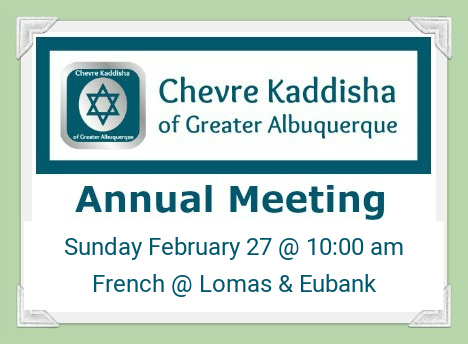It's the ultimate mitzvah, Rabbi Min Kantrowitz tells us - participating in a tahara, the ritual purification of the body of a Jewish person before that person is buried.
Albuquerque Chevre Kaddisha
Continues to Serve the Jewish Community
Come and Learn on February 27 - and Consider Joining
Funerals are a time when families often feel the need to connect with their cultural roots. While many Jews know that traditional Jewish law does not permit embalming and cremation, fewer know about the ancient Tahara purification ritual that honors the deceased.
This sacred ritual, carried out by a trained and dedicated group of volunteers—the Chevre Kaddisha (Holy Society)— is based on respect — for the body of the deceased, for the grieving family and friends, and for the whole community. Traditional Jewish burials recognize that death is a natural part of the life cycle, and that burial in the earth is the time-honored way to honor that cycle. The members of the Albuquerque Chevre Kaddisha are devoted to doing the holy work of preparing the bodies of Jews for proper burial.
Since the work of the Chevre Kaddisha involves actions to which most people have a reaction of aversion, fear, or disinterest, why are a group of Jews so dedicated to this mitzvah? Why do so many families, formally affiliated with congregations or not, desire this ritual for their loved ones at the time of death?
Why might you consider learning more about the work of the Chevre Kaddisha, attending an hour-long training session, and perhaps joining this Sacred Society?
When someone you love dies, it is appropriate and natural to continue to care about them, to desire that their body be treated with dignity, respect, honor and love. The ritual of tahara (purification) undertaken by the Chevre Kaddisha, does exactly that. Jewish tradition refers to the concept as ‘kavod ha’met’ honoring the deceased.
What do Chevre Kaddisha members do?
After receiving information about the death of a Jewish person from the funeral home, clergy or relatives, a designated member of the Chevre Kaddisha contacts other trained members to see if they are available to serve. For the sake of modesty, male members of the Chevre Kaddisha work with men who have died; females with women.
Teams of four to six people gather at the funeral home, say a few prayers, don protective garments and gather the required supplies. Members check the funeral garments, white multi-piece items of clothing made of cotton or linen, quite similar to those worn by the High Priest at the time the ancient Temple stood.
We then gently cleanse the body of the deceased, modestly, uncovering only parts of the body at a time, avoiding any appearance of impropriety. Cleansing is done quietly, solemnly, respectfully and lovingly.
The team then performs the ritual purification, where a clean white sheet is held over the deceased, like a chuppah (wedding canopy) and a measured amount of water is gently poured over the person, while the members recite a Hebrew verse about purity.
The team members use soft towels to dry off the body of the deceased before dressing it in the funeral garments and carefully transferring it into the coffin. Broken shards of pottery are placed on the eyes and mouth, indicating the finality of death. Earth from Israel is sprinkled over the deceased, connecting them to the land of their ancestors.
Traditionally, Chevre Kaddisha members apologize for any awkwardness or errors, express gratitude for participating in this mitzvah, and ask that the memory of the deceased be a blessing.
After closing the coffin, the team does a few final prayers, and thanks each other. Members leave the room, each time permanently changed, moved by the experience, and grateful for the gift of life.
Tahara is available, without charge,
to any Jew in the community.
to any Jew in the community.
There are very rare exceptions where a Tahara cannot be done, due to the condition of the body, the time period between death and burial, or the lack of available volunteers.
All the members of the Chevre Kaddisha started out with doubts, moved through them and are now very willing to talk to others in the community about their experiences.
Families interested in preplanning a Tahara for themselves or arranging one for a recently deceased family member, irrespective of an affiliation with a temple or synagogue, can speak to their clergy or funeral home about arranging a Tahara.
You can also take this a step further by learning more about the work of the Chevre Kaddisha and perhaps considering becoming a Chevre Kaddisha volunteer.
Members welcome Jewish men and women, ages 18 years and older, to come to our annual meeting and training session on Sunday, February 27 at the French Funeral Home located at 10500 Lomas Blvd NE. French will provide drinks and the use of the preparation room.
The current Chevre Kaddisha members will meet at 10:00 am to talk about issues that may have arisen during the year, share solutions and support each others work.
During a short break, you can learn about our local Chevre Kaddisha practices and meet volunteers – many who are your friends and neighbors.
Then, at about 11:15 am, we'll have a training session that will both refresh and update the skills of established Chevre Kaddisha members and give prospective volunteers a realistic view of the Tahara ceremony.
(505) 750-2465







No comments:
Post a Comment